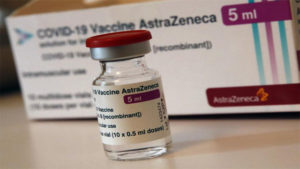 Two doses of the AstraZeneca Covid-19 vaccine were found to have only a 10.4% efficacy against mild-to-moderate infections caused by the B.1.351 South Africa variant, according to a phase 1b-2 clinical trial published on Tuesday in the New England Journal of Medicine. This is a cause for grave concern as the South African variants share similar mutations to the other variants leaving those vaccinated with the AstraZeneca vaccine potentially exposed to multiple variants. This new finding should force a rapid acceleration of second-generation vaccines and encourage further research into the possibility of a pancoronavirus vaccine.
Two doses of the AstraZeneca Covid-19 vaccine were found to have only a 10.4% efficacy against mild-to-moderate infections caused by the B.1.351 South Africa variant, according to a phase 1b-2 clinical trial published on Tuesday in the New England Journal of Medicine. This is a cause for grave concern as the South African variants share similar mutations to the other variants leaving those vaccinated with the AstraZeneca vaccine potentially exposed to multiple variants. This new finding should force a rapid acceleration of second-generation vaccines and encourage further research into the possibility of a pancoronavirus vaccine.
The trial evaluated the safety and the efficacy of the AstraZeneca vaccine in HIV-negative adults aged between 18 to 64 years old with a median age of 30 years old. The trial was conducted between June 24 and November 9, 2020 in South Africa using a multisite, double-blind, randomized, placebo-controlled approach. Out of the trial’s 750 vaccine recipients, 19 (2.5%) developed mild to moderate COVID-19 more than 14 days after the second dose, compared with 23 of 717 placebo recipients (3.2%). Of the 42 total cases of Covid-19, 39 (93%) were caused by the B.1.351 South Africa variant. These results demonstrated that the AstraZeneca vaccine was only 10.4% effective against the B.1.351 South Africa variant.
It is important to note that there were still no cases of hospitalization for severe Covid-19 or deaths observed in the study. Yet the authors did caution that the relatively young median age of participants (30 years) likely influenced the lack of severe Covid-19 cases.
